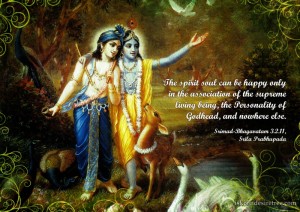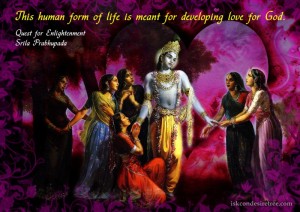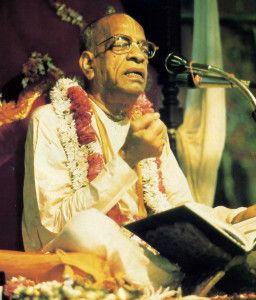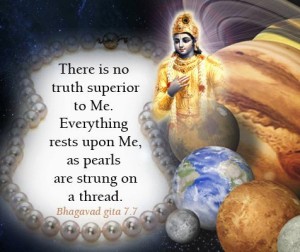Hare Krishna.
25th July, 2014. Gurgaon.
As I read Srila Prabhupada’s book a little more carefully now, I marvel at the depth of his writings and realise the amount of gems scattered in every single page of his translations and commentaries. This inspires me to write more about them rather than my own baby realisations. I also feel that writing about my own self is not exactly a very Vaishanava thing to do. However being shameless I will still share them from time to time but if you will all allow me then I would like to write more about what Srila Prabhupada left us as a legacy for next 10,000 years.
Some devotees have requested me to take up questions from readers, I have no qualification to answer them but if you have some questions then you can mail me at giriraj.bcs@gmail.com or leave them in the comments and I can try my best to serve you by replying after verification from a senior devotee. We can make a separate page for them on the website if it becomes regular. Here is another gem from Srila Prabhupada.
Q: Why does ISKCON advocates worship of Krishna to the exclusion of the demigods ?
Ans: Srila Prabhupada answers this question in his purport of SB 4.31.14, this verse is also quoted by Mahāprabhu in cc madhya 22.63 to Sri Sanatana Goswami.
Translation
As pouring water on the root of a tree energizes the trunk, branches, twigs and everything else, and as supplying food to the stomach enlivens the senses and limbs of the body, simply worshiping the Supreme Personality of Godhead through devotional service automatically satisfies the demigods, who are parts of that Supreme Personality.
Srila Prabhupada writes in his Purport
Sometimes people ask why this Kṛṣṇa consciousness movement simply advocates worship of Kṛṣṇa to the exclusion of the demigods. The answer is given in this verse. The example of pouring water on the root of a tree is very appropriate. In Bhagavad-gītā (15.1) it is said, ūrdhva-mūlam adhaḥ-śākham: this cosmic manifestation has expanded downward, and the root is the Supreme Personality of Godhead.
As the Lord confirms in Bhagavad-gītā (10.8), ahaṁ sarvasya prabhavaḥ: “I am the source of all spiritual and material worlds.” Kṛṣṇa is the root of everything; therefore rendering service to the Supreme Personality of Godhead, Kṛṣṇa (kṛṣṇa-sevā), means automatically serving all the demigods.
Sometimes it is argued that karma and jñāna require a mixture of bhakti in order to be successfully executed, and sometimes it is argued that bhakti also requires karma and jñāna for its successful termination. The fact is, however, that although karma and jñāna cannot be successful without bhakti, bhakti does not require the help of karma and jñāna. Actually, as described by Śrīla Rūpa Gosvāmī, anyābhilāṣitā-śūnyaṁ jñāna-karmādy-anāvṛtam: [Madhya 19.167] pure devotional service should not be contaminated by the touch of karma and jñāna.
Modern society is involved in various types of philanthropic works, humanitarian works and so on, but people do not know that these activities will never be successful unless Kṛṣṇa, the Supreme Personality of Godhead, is brought into the center. One may ask what harm there is in worshiping Kṛṣṇa and the different parts of His body, the demigods, and the answer is also given in this verse. The point is that by supplying food to the stomach, the indriyas, the senses, are automatically satisfied. If one tries to feed his eyes or ears independently, the result is only havoc. Simply by supplying food to the stomach, we satisfy all of the senses. It is neither necessary nor feasible to render separate service to the individual senses. The conclusion is that by serving Kṛṣṇa (kṛṣṇa-sevā), everything is complete. As confirmed in Caitanya-caritāmṛta (Madhya 22.62), kṛṣṇe bhakti kaile sarva-karma kṛta haya: if one is engaged in the devotional service of the Lord, the Supreme Personality of Godhead, everything is automatically accomplished.
All glories to Sri Chaitanaya Charitramrita.
All glories to Srila Prabhupada.










